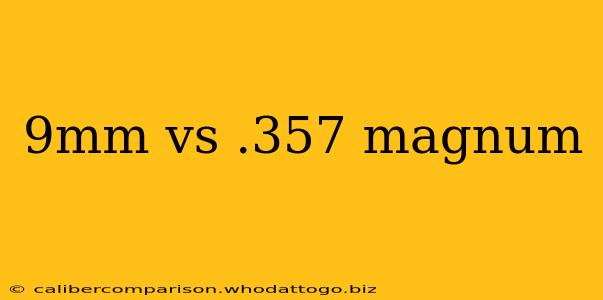Choosing the right cartridge for self-defense, hunting, or sport shooting is a crucial decision. This detailed comparison of the 9mm and .357 Magnum cartridges will help you understand their strengths and weaknesses, ultimately guiding you towards the best option for your needs. We'll delve into ballistics, recoil, capacity, cost, and application to provide a comprehensive overview.
Ballistics: Power and Penetration
The most significant difference lies in their ballistic performance. The .357 Magnum, a larger and more powerful round, boasts significantly higher muzzle energy and velocity. This translates to greater stopping power and penetration, making it effective against larger game and at longer ranges.
-
.357 Magnum: Known for its substantial stopping power due to its heavier bullet weight and higher velocity. This cartridge delivers a powerful punch, making it effective for self-defense and hunting medium-sized game. Penetration is significant.
-
9mm: A smaller, lighter round with less muzzle energy than the .357 Magnum. However, the 9mm offers acceptable stopping power for self-defense, particularly with modern, expanding ammunition. Penetration is less than the .357 Magnum, leading to reduced risk of over-penetration.
Penetration Depth & Overpenetration Considerations:
The .357 Magnum's superior penetration is a double-edged sword. While advantageous in certain hunting scenarios, it increases the risk of overpenetration in populated areas. A bullet that passes through a target and continues to travel poses a significant danger to bystanders. The 9mm generally offers better control in this regard.
Recoil and Shootability
Recoil is another critical factor to consider. The .357 Magnum's higher power results in considerably more recoil, making it more challenging to control, especially for inexperienced shooters. This can affect accuracy and speed of follow-up shots.
-
.357 Magnum: Significant recoil can make sustained firing difficult and lead to fatigue. This cartridge demands more training and practice to master.
-
9mm: Significantly less recoil than the .357 Magnum, leading to easier handling and faster target acquisition. This makes the 9mm more suitable for beginners and for situations requiring rapid, accurate fire.
Capacity: Rounds per Magazine
Handguns chambered in 9mm typically offer higher magazine capacities than those chambered in .357 Magnum. This translates to more rounds available in a self-defense situation.
-
.357 Magnum: Revolvers commonly chambered in .357 Magnum often have limited capacity (typically 5-6 rounds).
-
9mm: Semi-automatic pistols chambered in 9mm typically offer magazine capacities ranging from 10 to 17 rounds or more, providing a significant advantage in terms of ammunition capacity.
Cost: Ammunition and Firearms
Ammunition for the .357 Magnum is generally more expensive than 9mm ammunition. Similarly, .357 Magnum revolvers can be more costly than 9mm semi-automatic pistols.
-
.357 Magnum: Higher cost of ammunition and firearms.
-
9mm: Lower cost of ammunition and firearms, making it a more budget-friendly option.
Applications: Hunting, Self-Defense, and Sport Shooting
The best choice between 9mm and .357 Magnum depends on the intended application:
Self-Defense:
Both cartridges are suitable for self-defense. The 9mm's lower recoil and higher capacity are advantages, while the .357 Magnum offers greater stopping power. The decision often comes down to personal preference and training.
Hunting:
The .357 Magnum is generally preferred for hunting medium-sized game due to its higher power and penetration. The 9mm is less suitable for hunting except perhaps very small game at close range.
Sport Shooting:
Both cartridges are popular in sport shooting, with the 9mm being more commonly used in practical shooting competitions due to its lower recoil and higher capacity.
Conclusion: The Right Choice for You
There's no single "better" cartridge; the optimal choice depends entirely on your individual needs and priorities. Consider your experience level, intended use, budget, and local regulations when making your decision. Consult with experienced firearms instructors and carefully research both cartridges before making a purchase.

